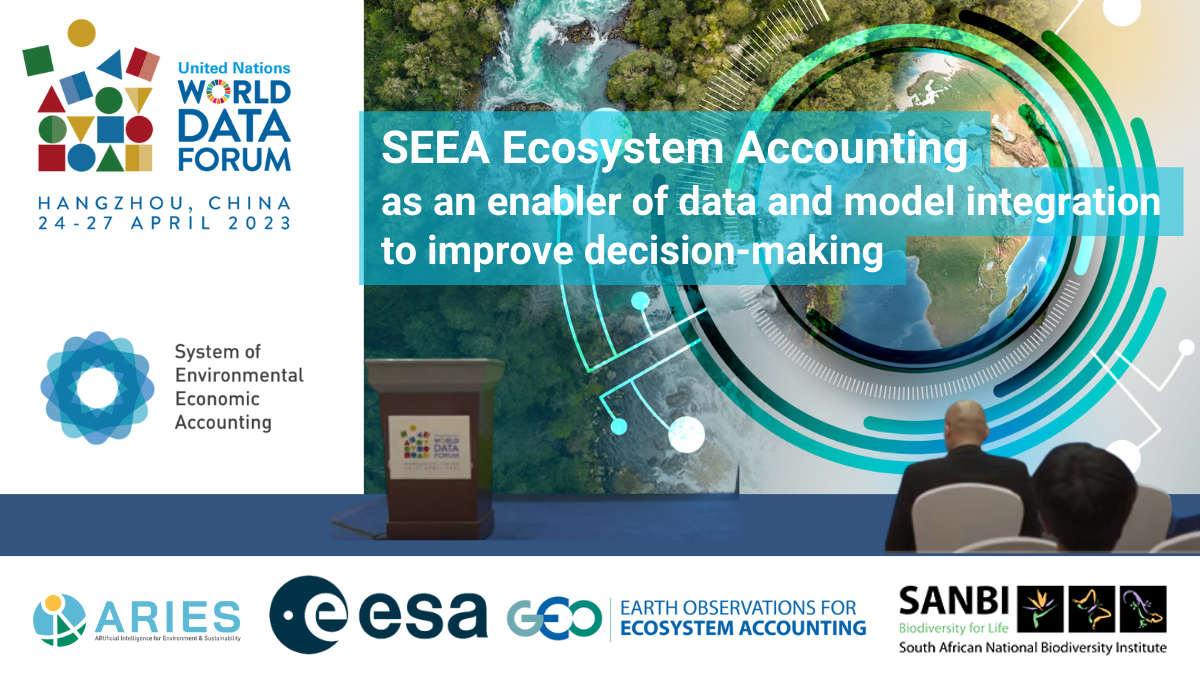
UN World Data Forum side event: SEEA EA as enabler of data and model integration to improve decision-making
Ecosystems and biodiversity play a critical role in underpinning sustainable development and socio-economic progress. The recently adopted “Kunming-Montreal Global Biodiversity Framework” (GBF) is a landmark framework that includes four goals and 23 targets to be achieved by 2030, as well as four long-term goals for 2050 related to the 2050 Vision for Biodiversity of living in harmony with nature. The GBF includes a monitoring framework, which is designed to ensure that implementation of the GBF is results-oriented and can be monitored in a transparent manner, and, importantly, it makes explicit reference to official statistics and the System of Environmental-Economic Accounting (SEEA) statistical standard.
The SEEA is the accepted international statistical standard for environmental-economic accounting, providing a framework for organizing and presenting statistics on the environment and its relationship with the economy. It brings together economic and environmental information in an internationally agreed set of standard concepts, definitions, classifications, accounting rules and tables to produce internationally comparable statistics. The SEEA is composed of two parts, the SEEA Central Framework and the SEEA Ecosystem Accounting.
Natural capital accounting (NCA) is an essential tool for measuring the contributions of nature to people and the economy. This session will examine how NCA, underpinned by the SEEA Ecosystem Accounting adopted in March 2021, facilitates effective decisions by providing an integrated statistical framework to go beyond GDP.
It will further feature the Artificial Intelligence for Environment & Sustainability (ARIES) as an open-source technology that integrates data and models independently developed by the global and national research community, using web-based repositories discovered/connected through artificial intelligence. Launched in 2021, ARIES for SEEA Explorer lowers the barriers to compiling ecosystem accounts allowing countries to compile initial estimates of ecosystem extent, condition and ecosystem services. The application generates customizable ecosystem accounts for any user-specified area (country, administrative region, watershed, etc.) using freely available remote-sensing derived data and models, and best available national data and models.
Earth observation technologies have shown to be a crucial element in ecosystem accounting and are challenging the traditional data compilation and analysis in the national statistical offices. With this, the multidisciplinary nature of this work became evident and implementation of ecosystem accounting is highlighting the need for close collaboration with many national agencies in the national statistical systems. The session will thus feature the perspectives of using Earth Observation data and technologies for ecosystem accounting, in particular for the development of ecosystem extent and condition accounts. It will also showcase achievements in South Africa, where several sets of accounts have been developed in a collaborative manner combining modelling approaches and earth observation data with other forms of data and knowledge.
Wednesday, 26 April 2023
14:45 – 15:45 (GMT+8), virtual
Organisers: Basque Center for Climate Change (BC3); South African National Biodiversity Institute (SANBI); European Space Agency (ESA); GEO Secretariat; United Nations Statistics Division (UNSD)
PROVISIONAL AGENDA
Moderator: Madeeha Bajwa, GEO Secretariat
- Introduction to the SEEA Ecosystem Accounting: Alessandra La Notte, Joint Research Centre of the European Commission
- Presentation on the ARIES for SEEA explorer: Ferdinando Villa, Basque Center for Climate Change (BC3)
- Using earth observation for Ecosystem Accounting: Marc Paganini, European Space Agency (ESA)
- Ecosystem accounting in South Africa: Amanda Driver, South African National Biodiversity Institute (SANBI)
- Q&A
The event page on the UNWDF website.
For recording see YouTube here.
